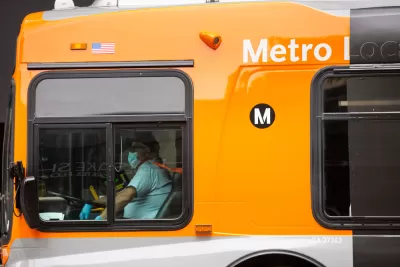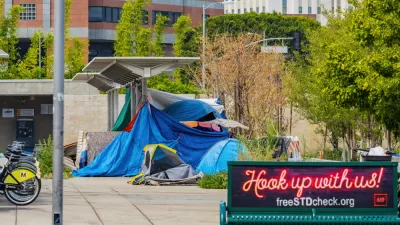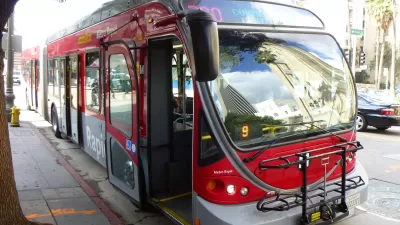Metro Los Angeles is rolling back public health measures on its buses systemwide in the middle of the worst Covid wave of the entire pandemic.

The Los Angeles County Metropolitan Transportation Authority (Metro) is resuming normal boarding operations on buses today. Since March 2020, the nation's second busiest bus system had been requiring passengers to use rear doors to board and light buses without paying fares.
An article by Ryan Fonseca for LAist provides details on the resumption of front door boarding on Metro, noting that rear door boarding and fare-free rides were implemented to protect riders and drivers during the pandemic: "Skipping the fares and requiring rear-door boarding made it possible to do a better job of social distancing."
Advocates are questioning the timing of the change, with Covid infections in the county higher than they've been at any point in the pandemic. Metro seems to be aware of the current public health risks, announcing on January 4 that it was canceling all enrollment events for its low-income fare program (not to be confused with a fare-free pilot program under consideration at Metro in 2021).
Fare-free transit has been one of the hottest topics in planning during the pandemic. Albuquerque last week announced the largest fare-free pilot program of any U.S. city to date.
FULL STORY: Free Bus Rides Are Ending On LA Metro. Check Out The Limited-Time Discounts Going Into Place

Alabama: Trump Terminates Settlements for Black Communities Harmed By Raw Sewage
Trump deemed the landmark civil rights agreement “illegal DEI and environmental justice policy.”

Planetizen Federal Action Tracker
A weekly monitor of how Trump’s orders and actions are impacting planners and planning in America.

The 120 Year Old Tiny Home Villages That Sheltered San Francisco’s Earthquake Refugees
More than a century ago, San Francisco mobilized to house thousands of residents displaced by the 1906 earthquake. Could their strategy offer a model for the present?

In Both Crashes and Crime, Public Transportation is Far Safer than Driving
Contrary to popular assumptions, public transportation has far lower crash and crime rates than automobile travel. For safer communities, improve and encourage transit travel.

Report: Zoning Reforms Should Complement Nashville’s Ambitious Transit Plan
Without reform, restrictive zoning codes will limit the impact of the city’s planned transit expansion and could exclude some of the residents who depend on transit the most.

Judge Orders Release of Frozen IRA, IIJA Funding
The decision is a victory for environmental groups who charged that freezing funds for critical infrastructure and disaster response programs caused “real and irreparable harm” to communities.
Urban Design for Planners 1: Software Tools
This six-course series explores essential urban design concepts using open source software and equips planners with the tools they need to participate fully in the urban design process.
Planning for Universal Design
Learn the tools for implementing Universal Design in planning regulations.
Clanton & Associates, Inc.
Jessamine County Fiscal Court
Institute for Housing and Urban Development Studies (IHS)
City of Grandview
Harvard GSD Executive Education
Toledo-Lucas County Plan Commissions
Salt Lake City
NYU Wagner Graduate School of Public Service





























